| Reviews & Columns |
|
Reviews DVD TV on DVD Blu-ray 4K UHD International DVDs In Theaters Reviews by Studio Video Games Features Collector Series DVDs Easter Egg Database Interviews DVD Talk Radio Feature Articles Columns Anime Talk DVD Savant Horror DVDs The M.O.D. Squad Art House HD Talk Silent DVD
|
DVD Talk Forum |
|
|
| Resources |
|
DVD Price Search Customer Service #'s RCE Info Links |
|
Columns
|
|
|
Two Days, One Night: The Criterion Collection
The Criterion Collection // PG-13 // August 25, 2015
List Price: $39.95 [Buy now and save at Amazon]
The Film:
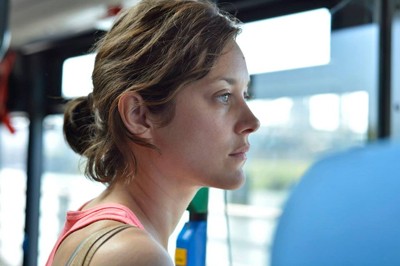 The value of human life sounds like a rather broad, obvious theme, but rarely do films tackle the literal and morally complex facets of it, the rational and emotional sacrifices ordinary people are willing to make -- and not -- for the benefit of another person. Two Days, One Night, the latest film from The Kid with a Bike directors Jean-Pierre and Luc Dardenne, approaches that concept in an incredibly direct fashion, focused on a depressed woman coping with her own self-worth who must convince co-workers she's valuable enough to stay employed at their job in lieu of much-needed pay increases. Driven by a phenomenal performance from Marion Cotillard, the Dardenne Brothers' frank voyeuristic perspective follows her character, Sandra, as she bravely pursues support over the course of a weekend, highlighting the personal turmoil involved in asking others to care for her needs more than they care for their own dire situations. While powerful in premise and raw execution, the film's rash usage of mental instability complicates its commentary on adversity and morale, for better and for worse.
The value of human life sounds like a rather broad, obvious theme, but rarely do films tackle the literal and morally complex facets of it, the rational and emotional sacrifices ordinary people are willing to make -- and not -- for the benefit of another person. Two Days, One Night, the latest film from The Kid with a Bike directors Jean-Pierre and Luc Dardenne, approaches that concept in an incredibly direct fashion, focused on a depressed woman coping with her own self-worth who must convince co-workers she's valuable enough to stay employed at their job in lieu of much-needed pay increases. Driven by a phenomenal performance from Marion Cotillard, the Dardenne Brothers' frank voyeuristic perspective follows her character, Sandra, as she bravely pursues support over the course of a weekend, highlighting the personal turmoil involved in asking others to care for her needs more than they care for their own dire situations. While powerful in premise and raw execution, the film's rash usage of mental instability complicates its commentary on adversity and morale, for better and for worse.
Having recently overcome a bout with depression that kept her away from her job at a solar-panel construction factory, wife and mother Sandra (Cotillard) has finally reached a point where she's ready to abandon her medication and return to work. All that changes at the beginning of her weekend, though, when she's informed by one of her closest co-workers that the company has taken a vote, electing to accept bonuses to their salaries in exchange for letting her go and upping their hours. She's also notified that a second, secret vote on the matter will be held on the following Monday morning in response to some charges of manipulation against the company's higher-ups, giving Sandra the weekend to track down the voters and plead her case for keeping her necessary job. With the support of her already patient husband (Fabrizio Rongione) and armed with water and medication, she embarks on what's sure to be a draining endeavor, considering the circumstances.
Unassuming yet smartly-composed dramatic suspense gets Two Days, One Night face-to-face with its heavy thematic potential, exploring different levels of desperation through Sandra's systematic pleas to her co-workers as the time ticks down to the second vote. Sandra losing her job is obviously a significant blow to her family, but her journeys across town quickly point out that everyone's struggling to make ends meet, whether it's refurbishing goods to pay for the needs of children or rebounding from a divorce.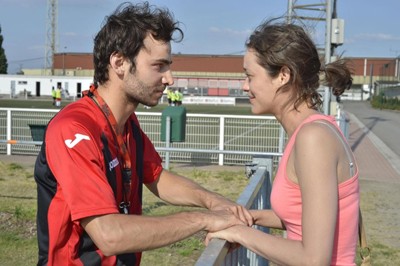 What starts with the headlong motivation to win influence from the people who voted against Sandra evolves into a distressing portrayal of what's to be lost, the working-class people who will continue to suffer, if the new vote overturns the decision. Each individual story is handled unpretentiously and enriched by little details before Sandra instigates her real-talk conversations, whether it's in the type of home she's visiting or the person who initially answers the door and points Sandra to her next target. The fluctuation of emotion between each one, the victories and defeats following those diverse exchanges, shapes the experience into a tense expressive rollercoaster ... intentionally repetitive and far-fetched in design as it may be.
What starts with the headlong motivation to win influence from the people who voted against Sandra evolves into a distressing portrayal of what's to be lost, the working-class people who will continue to suffer, if the new vote overturns the decision. Each individual story is handled unpretentiously and enriched by little details before Sandra instigates her real-talk conversations, whether it's in the type of home she's visiting or the person who initially answers the door and points Sandra to her next target. The fluctuation of emotion between each one, the victories and defeats following those diverse exchanges, shapes the experience into a tense expressive rollercoaster ... intentionally repetitive and far-fetched in design as it may be.
Marion Cotillard's nuanced performance takes great strides towards shaping the deliberate tempo of Two Days, One Night, given how the film focuses on Sandra's wavering resolve from location to location. The weight of the situation can be seen in subtle changes of her body language during her lengthy walks between stops, plainly visible in her shifts from depressive fatalism to desperate anxiety and back again upon arriving at each doorstep. Sandra doesn't have much of a defense to their decision given her leave of absence, having only her potential hardship and hearsay of bias against her as a bargaining chip, so observing how she responds to the co-workers' explanations becomes the heart and soul of the experience. Cotillard's understated depiction of anxiety and depression becomes absorbing to watch as she repeatedly contemplates a full retreat back to her bed, the burden of cornering people into a moral dilemma dragging her down each time. Authentic performances from the actors playing her co-workers are vital, but this is all about embodying a reflection of Sandra's various states, realized brilliantly by Cotillard.
Since she's traveling around pleading for others to make a different judgment call on her, Two Days, One Night instinctively puts us in the uncomfortable position of also evaluating Sandra on her merits and readiness, constantly asking whether she's really ready to return to the workforce and justify a reversal of the decision. A coarse but invigorating portrayal of inner strength emerges as she struggles to keep her composure amid her issues, where the synergy between Sandra and her diverse co-workers would've expressed plenty about the complexity of deciding a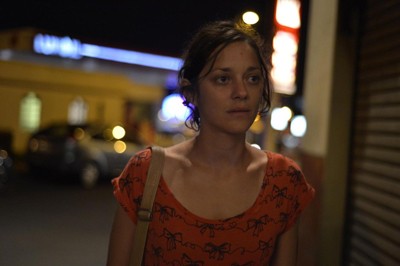 person's fate had the film simply continued on that course. Developments later on alter that perspective, though, proving the concerns about her stability might be merited and changing the conversation that The Dardennes are having about this wife/mother. Elevated dramatics hinged on Sandra's worsening condition undermine the strengths of their restrained storytelling methods and how they're approaching certain themes, replaced with doubt over both the likelihood of the turn of events and towards her capacity to cope, ringing a bell that cannot be unrung.
person's fate had the film simply continued on that course. Developments later on alter that perspective, though, proving the concerns about her stability might be merited and changing the conversation that The Dardennes are having about this wife/mother. Elevated dramatics hinged on Sandra's worsening condition undermine the strengths of their restrained storytelling methods and how they're approaching certain themes, replaced with doubt over both the likelihood of the turn of events and towards her capacity to cope, ringing a bell that cannot be unrung.
Unsurprisingly, Jean-Pierre and Luc Dardenne don't provide a clear-cut outlook on the tough questions they raise with this added context in their emotionally involved last act, instead letting the outcome of Sandra's exhaustive campaigning and the second ballot speak for themselves. A stern, balanced portrayal of human sympathy and pragmatism takes shape at the end of Two Days, One Night that ultimately puts her on the spot, hanging on her decision of what to do next after being armed with several days of exploring the attitudes of her co-workers. Sandra's arrival in this position of agency becomes one of the film's thought-provoking high points, opening the door for it to posit a clear, unencumbered final impression on the value of other people, one that feels cohesive based on her traumatic internal experiences and appropriately hopeful about the virtues of determination and strength of will. The paths she walks to get there are rocky, at times needlessly self-inflicted and harmful to her progress, but ultimately rewarding once The Dardennes reveal where she's headed now.
The Blu-ray:
Continuing their relationship with IFC Films, The Criterion Collection have released Two Days, One Night as Spine #771 in their collection, packaged in their standard clear-case presentation with familiar promotional images on the inner and outer artwork. A foldout booklet accompanies the release, featuring production credits and information on the transfer itself, as well as an essay, "Economics is Emotion" by Girish Shambu.
Video and Audio:
The cinematography of Two Days, One Night revolves around no-frills, lucid composition that comes close to documentarian frankness in following Sandra through the sun-baked streets of Belgium. Therefore, preserving the natural depth, color, and range of motion becomes paramount for this film that's constantly in motion, entirely shot and color-corrected in digital formats that make the transferring process less demanding. The Criterion Collection have worked the digital files composed for the film onto Blu-ray in its intended 1.85:1-framed, 1080p AVC encode, resulting in a predictably solid and clear presentation that never loses track of the intended realism behind Alain Marcoen's photography. The skin tones and salmon color of Sandra's top, the depth of field in what awaits in the distance of her walks, the caliber of detail on natural surfaces and during close-ups, and the delicate changes in shadow density depending on the time of day are simply flawless. Barring one or two darker scenes with tricky contrast that reveal some banding and a few scenes of limited detail based on the digital medium, everything looks as intended here, and that's a splendid thing.
Naturalism should be all that's expected from the French 5.1 DTS-HD Master Audio track as well, mastered as 24-bit from the film's digital soundtrack, though there's less rear-channel activity than I would've liked even under those circumstances. The precision and space awareness of the dialogue is top-shelf quality, surgically using the space of the front channels for organic separation depending on Sandra's next location. A few subtle sound effects do emerge in the track -- the sound of car wheels on gravel and the grinding of a sander on tiles -- which are phenomenally crisp and atmospheric, though the back channel response to these elements is incredibly negligible. Mostly, the activity insists on remaining in its comfort zone at the front of the track, often near the center channel, which detracts from some ambient potential during the traveling sequences. There's no perceivable distortion or dropouts, and mid-range and bass response are appropriate for the film's fluctuating degrees of dialogue intensity, yielding a suitable audio accompaniment with the digital transfer. The included English subtitles are presented in strong white text and, as expected, are expertly translated.
Special Features:
Jean-Pierre and Luc Dardenne Interview (51:04 16x9 HD):
A lengthy discussion with the director brothers, subtitled in English, explores the origins of their story, starting with the literary sources for the idea of the worker vote and branching off into the particulars of the characterization, especially in how it relates to the company being so small in size. That discussion evolves into the complexity of shooting schedules and likening the camera's movement around Marion Cotillard to a "dance", elaborating on the particulars of scenes with delightful discussion about very specific details. In truth, the content here basically works like an abridged commentary with the Dardenne Brothers in the absence of a feature-length one, especially considering how the editors include the relevant scenes in clips around pertinent topics.
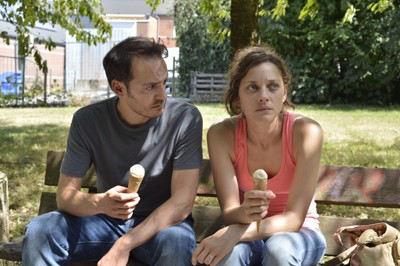 Marion Cotillard and Fabrizio Rongione Interview (22:19, 16x9 HD):
Marion Cotillard and Fabrizio Rongione Interview (22:19, 16x9 HD):
Speaking in English, Cotillard elaborates on the fabric of her character's journey and how she approached her complex emotional state, how she uses method tactics to get into her depressed mind-space ... and how she got a little too far into it. Rongione, subtitled in English, discusses body language and transcending a performance into the actions of real people, guided by the directors. They touch on the rehearsal process, eliminating accents, the trial and error of sequences and the way such a natural project changes how the actors interact with the cameras. Also paired with clips from the film, it's a nice, concise pair of interwoven chats with the actors.
On Location (36:47, 16x9 HD):
As a nice compliment to their interview piece (add both these featurettes up and you've almost got the runtime of a dedicated commentary!), the Dardenne Brothers grab a cameraman and drop in on four of the locations from the film -- the soccer field, the tile-sanding station, the brick home of one of the workers, and the foyer of an apartment -- and elaborate on their methods. A few cute split-screen moments feature the brothers casually retracting the steps of the scenes, while being at the locations seems to spark memories and their compulsion to elaborate. They discuss aesthetics, the number of takes, and about taking the heart of their subject matter seriously in sometimes tangential anecdotes. It's a very enjoyable piece.
The Criterion Collection have also includes a series of other semi-related features, including a documentary made by The Dardenne Brothers, When Leon M's Boat Went Down The Meuse For the First Time (38:18, 4x3 SD), that proves a foundation for their perspective on workforce drama through their focus on a Belgian strike in the '60s. Accompanying the feature is an interview with The Dardennes on Leon M's Boat (20:44, 16x9 HD), where they discuss the inspiration behind their project, the equipment they used, and their focus on individuals instead of ideology. A brief, somewhat broad video essay from Kent Jones, To Be An I (8:32, 16x9 HD) examines the ways that the Dardenne Brothers' work connects to hope and the essence of everyday lives, while a Trailer (1:53, 16x9 HD) caps off the rest of the supplemental content.
Final Thoughts:
Two Days, One Night is a substantial, evocative entry into the oeuvre of Jean-Pierre and Luc Dardenne, focused on a woman who works around the clock over a weekend -- and against her own depression and self-doubt -- to convince over a dozen of her co-workers to keep her on at her place of employment, instead of having her fired and increasing their pay. Marion Cotillard's performance is a restrained powerhouse embodying that turmoil: it's mesmerizing to watch as she thrusts herself and her co-workers in the uncomfortable, volatile position of asking for their support instead of receiving a much-needed bonus, then experiences the repercussions that these scenarios have on her mental state. Meaningful themes of personal sacrifice, human decency, and the ebbs and flows of hope already sustain a strong presence in the film, but a turn of events later on takes matters a few dramatic steps too far, losing the consistency of its perspective in the process and keeping the film just shy of greatness as a result. The Criterion Collection's Blu-ray looks and sounds terrific, and contains a huge load of splendid extras that include insightful interviews, on-location explorations, and one of The Dardennes' documentary features. Strongly Recommended.
Thomas Spurlin, Staff Reviewer -- DVDTalk Reviews | Personal Blog/Site
 The value of human life sounds like a rather broad, obvious theme, but rarely do films tackle the literal and morally complex facets of it, the rational and emotional sacrifices ordinary people are willing to make -- and not -- for the benefit of another person. Two Days, One Night, the latest film from The Kid with a Bike directors Jean-Pierre and Luc Dardenne, approaches that concept in an incredibly direct fashion, focused on a depressed woman coping with her own self-worth who must convince co-workers she's valuable enough to stay employed at their job in lieu of much-needed pay increases. Driven by a phenomenal performance from Marion Cotillard, the Dardenne Brothers' frank voyeuristic perspective follows her character, Sandra, as she bravely pursues support over the course of a weekend, highlighting the personal turmoil involved in asking others to care for her needs more than they care for their own dire situations. While powerful in premise and raw execution, the film's rash usage of mental instability complicates its commentary on adversity and morale, for better and for worse.
The value of human life sounds like a rather broad, obvious theme, but rarely do films tackle the literal and morally complex facets of it, the rational and emotional sacrifices ordinary people are willing to make -- and not -- for the benefit of another person. Two Days, One Night, the latest film from The Kid with a Bike directors Jean-Pierre and Luc Dardenne, approaches that concept in an incredibly direct fashion, focused on a depressed woman coping with her own self-worth who must convince co-workers she's valuable enough to stay employed at their job in lieu of much-needed pay increases. Driven by a phenomenal performance from Marion Cotillard, the Dardenne Brothers' frank voyeuristic perspective follows her character, Sandra, as she bravely pursues support over the course of a weekend, highlighting the personal turmoil involved in asking others to care for her needs more than they care for their own dire situations. While powerful in premise and raw execution, the film's rash usage of mental instability complicates its commentary on adversity and morale, for better and for worse. Having recently overcome a bout with depression that kept her away from her job at a solar-panel construction factory, wife and mother Sandra (Cotillard) has finally reached a point where she's ready to abandon her medication and return to work. All that changes at the beginning of her weekend, though, when she's informed by one of her closest co-workers that the company has taken a vote, electing to accept bonuses to their salaries in exchange for letting her go and upping their hours. She's also notified that a second, secret vote on the matter will be held on the following Monday morning in response to some charges of manipulation against the company's higher-ups, giving Sandra the weekend to track down the voters and plead her case for keeping her necessary job. With the support of her already patient husband (Fabrizio Rongione) and armed with water and medication, she embarks on what's sure to be a draining endeavor, considering the circumstances.
Unassuming yet smartly-composed dramatic suspense gets Two Days, One Night face-to-face with its heavy thematic potential, exploring different levels of desperation through Sandra's systematic pleas to her co-workers as the time ticks down to the second vote. Sandra losing her job is obviously a significant blow to her family, but her journeys across town quickly point out that everyone's struggling to make ends meet, whether it's refurbishing goods to pay for the needs of children or rebounding from a divorce.
 What starts with the headlong motivation to win influence from the people who voted against Sandra evolves into a distressing portrayal of what's to be lost, the working-class people who will continue to suffer, if the new vote overturns the decision. Each individual story is handled unpretentiously and enriched by little details before Sandra instigates her real-talk conversations, whether it's in the type of home she's visiting or the person who initially answers the door and points Sandra to her next target. The fluctuation of emotion between each one, the victories and defeats following those diverse exchanges, shapes the experience into a tense expressive rollercoaster ... intentionally repetitive and far-fetched in design as it may be.
What starts with the headlong motivation to win influence from the people who voted against Sandra evolves into a distressing portrayal of what's to be lost, the working-class people who will continue to suffer, if the new vote overturns the decision. Each individual story is handled unpretentiously and enriched by little details before Sandra instigates her real-talk conversations, whether it's in the type of home she's visiting or the person who initially answers the door and points Sandra to her next target. The fluctuation of emotion between each one, the victories and defeats following those diverse exchanges, shapes the experience into a tense expressive rollercoaster ... intentionally repetitive and far-fetched in design as it may be. Marion Cotillard's nuanced performance takes great strides towards shaping the deliberate tempo of Two Days, One Night, given how the film focuses on Sandra's wavering resolve from location to location. The weight of the situation can be seen in subtle changes of her body language during her lengthy walks between stops, plainly visible in her shifts from depressive fatalism to desperate anxiety and back again upon arriving at each doorstep. Sandra doesn't have much of a defense to their decision given her leave of absence, having only her potential hardship and hearsay of bias against her as a bargaining chip, so observing how she responds to the co-workers' explanations becomes the heart and soul of the experience. Cotillard's understated depiction of anxiety and depression becomes absorbing to watch as she repeatedly contemplates a full retreat back to her bed, the burden of cornering people into a moral dilemma dragging her down each time. Authentic performances from the actors playing her co-workers are vital, but this is all about embodying a reflection of Sandra's various states, realized brilliantly by Cotillard.
Since she's traveling around pleading for others to make a different judgment call on her, Two Days, One Night instinctively puts us in the uncomfortable position of also evaluating Sandra on her merits and readiness, constantly asking whether she's really ready to return to the workforce and justify a reversal of the decision. A coarse but invigorating portrayal of inner strength emerges as she struggles to keep her composure amid her issues, where the synergy between Sandra and her diverse co-workers would've expressed plenty about the complexity of deciding a
 person's fate had the film simply continued on that course. Developments later on alter that perspective, though, proving the concerns about her stability might be merited and changing the conversation that The Dardennes are having about this wife/mother. Elevated dramatics hinged on Sandra's worsening condition undermine the strengths of their restrained storytelling methods and how they're approaching certain themes, replaced with doubt over both the likelihood of the turn of events and towards her capacity to cope, ringing a bell that cannot be unrung.
person's fate had the film simply continued on that course. Developments later on alter that perspective, though, proving the concerns about her stability might be merited and changing the conversation that The Dardennes are having about this wife/mother. Elevated dramatics hinged on Sandra's worsening condition undermine the strengths of their restrained storytelling methods and how they're approaching certain themes, replaced with doubt over both the likelihood of the turn of events and towards her capacity to cope, ringing a bell that cannot be unrung. Unsurprisingly, Jean-Pierre and Luc Dardenne don't provide a clear-cut outlook on the tough questions they raise with this added context in their emotionally involved last act, instead letting the outcome of Sandra's exhaustive campaigning and the second ballot speak for themselves. A stern, balanced portrayal of human sympathy and pragmatism takes shape at the end of Two Days, One Night that ultimately puts her on the spot, hanging on her decision of what to do next after being armed with several days of exploring the attitudes of her co-workers. Sandra's arrival in this position of agency becomes one of the film's thought-provoking high points, opening the door for it to posit a clear, unencumbered final impression on the value of other people, one that feels cohesive based on her traumatic internal experiences and appropriately hopeful about the virtues of determination and strength of will. The paths she walks to get there are rocky, at times needlessly self-inflicted and harmful to her progress, but ultimately rewarding once The Dardennes reveal where she's headed now.
The Blu-ray:
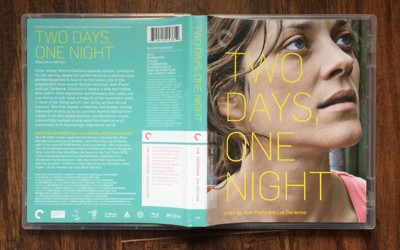 | 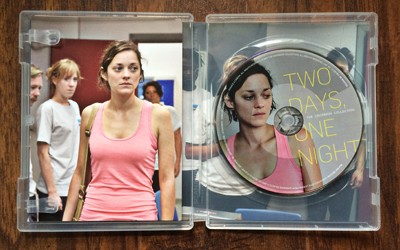 |
Continuing their relationship with IFC Films, The Criterion Collection have released Two Days, One Night as Spine #771 in their collection, packaged in their standard clear-case presentation with familiar promotional images on the inner and outer artwork. A foldout booklet accompanies the release, featuring production credits and information on the transfer itself, as well as an essay, "Economics is Emotion" by Girish Shambu.
Video and Audio:
The cinematography of Two Days, One Night revolves around no-frills, lucid composition that comes close to documentarian frankness in following Sandra through the sun-baked streets of Belgium. Therefore, preserving the natural depth, color, and range of motion becomes paramount for this film that's constantly in motion, entirely shot and color-corrected in digital formats that make the transferring process less demanding. The Criterion Collection have worked the digital files composed for the film onto Blu-ray in its intended 1.85:1-framed, 1080p AVC encode, resulting in a predictably solid and clear presentation that never loses track of the intended realism behind Alain Marcoen's photography. The skin tones and salmon color of Sandra's top, the depth of field in what awaits in the distance of her walks, the caliber of detail on natural surfaces and during close-ups, and the delicate changes in shadow density depending on the time of day are simply flawless. Barring one or two darker scenes with tricky contrast that reveal some banding and a few scenes of limited detail based on the digital medium, everything looks as intended here, and that's a splendid thing.
Naturalism should be all that's expected from the French 5.1 DTS-HD Master Audio track as well, mastered as 24-bit from the film's digital soundtrack, though there's less rear-channel activity than I would've liked even under those circumstances. The precision and space awareness of the dialogue is top-shelf quality, surgically using the space of the front channels for organic separation depending on Sandra's next location. A few subtle sound effects do emerge in the track -- the sound of car wheels on gravel and the grinding of a sander on tiles -- which are phenomenally crisp and atmospheric, though the back channel response to these elements is incredibly negligible. Mostly, the activity insists on remaining in its comfort zone at the front of the track, often near the center channel, which detracts from some ambient potential during the traveling sequences. There's no perceivable distortion or dropouts, and mid-range and bass response are appropriate for the film's fluctuating degrees of dialogue intensity, yielding a suitable audio accompaniment with the digital transfer. The included English subtitles are presented in strong white text and, as expected, are expertly translated.
Special Features:
Jean-Pierre and Luc Dardenne Interview (51:04 16x9 HD):
A lengthy discussion with the director brothers, subtitled in English, explores the origins of their story, starting with the literary sources for the idea of the worker vote and branching off into the particulars of the characterization, especially in how it relates to the company being so small in size. That discussion evolves into the complexity of shooting schedules and likening the camera's movement around Marion Cotillard to a "dance", elaborating on the particulars of scenes with delightful discussion about very specific details. In truth, the content here basically works like an abridged commentary with the Dardenne Brothers in the absence of a feature-length one, especially considering how the editors include the relevant scenes in clips around pertinent topics.
 Marion Cotillard and Fabrizio Rongione Interview (22:19, 16x9 HD):
Marion Cotillard and Fabrizio Rongione Interview (22:19, 16x9 HD): Speaking in English, Cotillard elaborates on the fabric of her character's journey and how she approached her complex emotional state, how she uses method tactics to get into her depressed mind-space ... and how she got a little too far into it. Rongione, subtitled in English, discusses body language and transcending a performance into the actions of real people, guided by the directors. They touch on the rehearsal process, eliminating accents, the trial and error of sequences and the way such a natural project changes how the actors interact with the cameras. Also paired with clips from the film, it's a nice, concise pair of interwoven chats with the actors.
On Location (36:47, 16x9 HD):
As a nice compliment to their interview piece (add both these featurettes up and you've almost got the runtime of a dedicated commentary!), the Dardenne Brothers grab a cameraman and drop in on four of the locations from the film -- the soccer field, the tile-sanding station, the brick home of one of the workers, and the foyer of an apartment -- and elaborate on their methods. A few cute split-screen moments feature the brothers casually retracting the steps of the scenes, while being at the locations seems to spark memories and their compulsion to elaborate. They discuss aesthetics, the number of takes, and about taking the heart of their subject matter seriously in sometimes tangential anecdotes. It's a very enjoyable piece.
The Criterion Collection have also includes a series of other semi-related features, including a documentary made by The Dardenne Brothers, When Leon M's Boat Went Down The Meuse For the First Time (38:18, 4x3 SD), that proves a foundation for their perspective on workforce drama through their focus on a Belgian strike in the '60s. Accompanying the feature is an interview with The Dardennes on Leon M's Boat (20:44, 16x9 HD), where they discuss the inspiration behind their project, the equipment they used, and their focus on individuals instead of ideology. A brief, somewhat broad video essay from Kent Jones, To Be An I (8:32, 16x9 HD) examines the ways that the Dardenne Brothers' work connects to hope and the essence of everyday lives, while a Trailer (1:53, 16x9 HD) caps off the rest of the supplemental content.
Final Thoughts:
Two Days, One Night is a substantial, evocative entry into the oeuvre of Jean-Pierre and Luc Dardenne, focused on a woman who works around the clock over a weekend -- and against her own depression and self-doubt -- to convince over a dozen of her co-workers to keep her on at her place of employment, instead of having her fired and increasing their pay. Marion Cotillard's performance is a restrained powerhouse embodying that turmoil: it's mesmerizing to watch as she thrusts herself and her co-workers in the uncomfortable, volatile position of asking for their support instead of receiving a much-needed bonus, then experiences the repercussions that these scenarios have on her mental state. Meaningful themes of personal sacrifice, human decency, and the ebbs and flows of hope already sustain a strong presence in the film, but a turn of events later on takes matters a few dramatic steps too far, losing the consistency of its perspective in the process and keeping the film just shy of greatness as a result. The Criterion Collection's Blu-ray looks and sounds terrific, and contains a huge load of splendid extras that include insightful interviews, on-location explorations, and one of The Dardennes' documentary features. Strongly Recommended.
|
| Popular Reviews |
| Sponsored Links |
|
|
| Sponsored Links |
|
|
| Release List | Reviews | Shop | Newsletter | Forum | DVD Giveaways | Blu-Ray | Advertise |
|
Copyright 2024 DVDTalk.com All Rights Reserved. Legal Info, Privacy Policy, Terms of Use,
Manage Preferences,
Your Privacy Choices | |||||||













